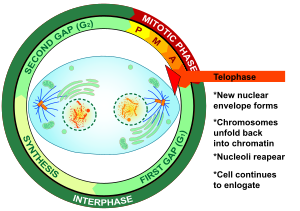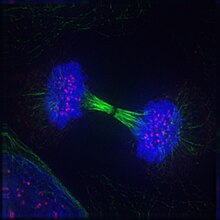

Telophase (from Ancient Greek τέλος (télos) 'end, result, completion' and φάσις (phásis) 'appearance') is the final stage in both meiosis and mitosis in a eukaryotic cell. During telophase, the effects of prophase and prometaphase (the nucleolus and nuclear membrane disintegrating) are reversed. As chromosomes reach the cell poles, a nuclear envelope is re-assembled around each set of chromatids, the nucleoli reappear, and chromosomes begin to decondense back into the expanded chromatin that is present during interphase. The mitotic spindle is disassembled and remaining spindle microtubules are depolymerized. Telophase accounts for approximately 2% of the cell cycle's duration.
Cytokinesis typically begins before late telophase[1] and, when complete, segregates the two daughter nuclei between a pair of separate daughter cells.
Telophase is primarily driven by the dephosphorylation of mitotic cyclin-dependent kinase (Cdk) substrates.[2]
- ^ Reece, Jane; Urry, Lisa; Cain, Michael; Wasserman, Steven; Minorsky, Peter; Jackson, Robert (2011). Campbell Biology (10th ed.). Pearson. ISBN 978-0-321-77565-8.
- ^ Morgan D (2007). The Cell Cycle. London, UK: New Science Press Ltd. pp. 154–155. ISBN 978-0-9539181-2-6.